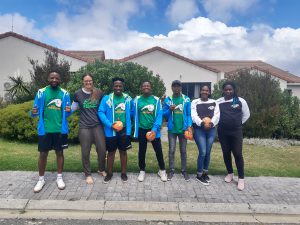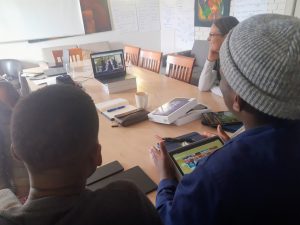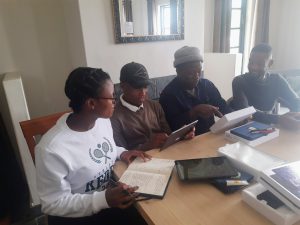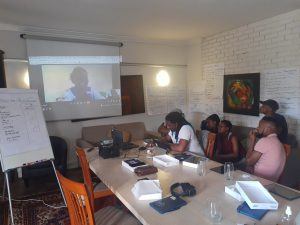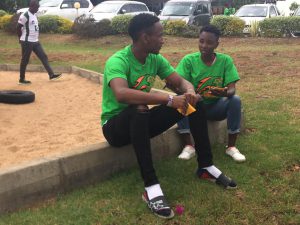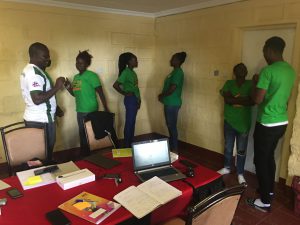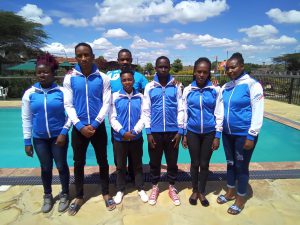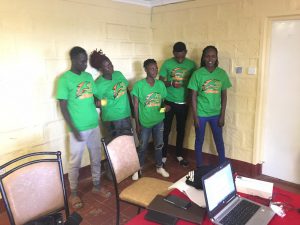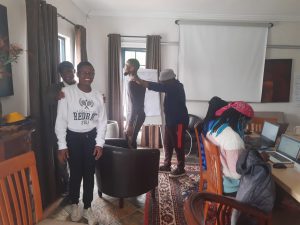The trilateral, virtual youth coach exchange is a new international encounter format of PlayHandball, Youth Abroad and the Handball Association Schleswig-Holstein. Young handball players from Germany, South Africa and Kenya participate in virtual encounters in the context of developmental youth work.
The trilateral exchange aims to promote and inspire young people as multipliers to use sport as an educational tool for sustainable development. As a youth handball development coach you can pass on your knowledge to children and young people in your environment. This is to support the sustainability goal UNSDG #4.7 “Sport as a tool to achieve development goals”.
The program consists of online workshops on the Sustainable Development Goals (SDGs) and sport, think tanks to collect ideas for future youth exchanges in sport, and practical phases in which participants work together in small transnational groups on ideas for training sessions, tournaments and/or activities. The exchange is not only virtual. The participants are empowered and supported to implement actions on site in their home countries. In addition, the future handball development coaches introduce their home countries to the other participants and forge links beyond the project period. Club partnerships, further encounters and / or visits are to be promoted.
From each partner country 5 young handball players* aged 18 – 27 can participate in the first virtual exchange.
Requirements are:
- You have an interest in handball and coaching.
- You are enthusiastique for a digital, intercultural dialogue.
- You are interested in social engagement.
- You have a basic English skills.
- You are between 18 and 27 years old.
- You are, but do not have to be, a player, coach or youth worker in a youth, sports or social club.
Simply send your informal application (letter of motivation and CV) to info@play-handball.org with the subject “Trilateral Online Youth Exchange”.
Project start for German participants is January 2022. Application deadline is December 15, 2021. We look forward to hearing from you.
- You get to know like-minded young people from other countries.
- You develop joint projects and get support for your own implementation in your club/location.
- You are part of an international peer-to-peer exchange.
- You acquire new skills: Coaching skills, youth development and online tools.
- You gain intercultural experience.
- You are part of an international network.
The program starts in January 2022 and lasts for 3 months. Already in November (26. – 28.11.2021) we have a three-day online exchange between the participants in Kenya and South Africa.
For the German participants, the kick-off workshop will be announced in December after the application deadline.
The timing of the regular virtual meetings will be discussed and decided together with all participants. Over a period of three months, all participants will meet regularly once a week in online workshops lasting approximately 3 hours (see schedule and content). In addition, international groups of three are formed. The groups, consisting of German, South African and Kenyan participants, work together on project ideas and support each other in planning their own training sessions, which the trainers carry out in their home associations and/or communities.
Commitment as an association and support of the project
If you as an association are interested in international exchanges and/or hosting young trainers from our partner countries, please contact us at info@play-handball.org.
If you would like to support the project financially, you are welcome to make a donation to the following account:
Play Handball Förderverein
Landessparkasse in Oldenburg (LZO)
BIC: SLZODE22XXX
IBAN: DE45 2805 0100 0090 9883 46
Timeline & Contents
| Nr. | What | When* | Content |
| 1. | Kick-Off Workshop per country
* for the German participants the workshop will take place in Jan’22 |
26-28 Nov’21 (only SA and KE)
Jan’22 for German TN ** |
|
| 2. | Online workshop “Sport as an educational tool for sustainable development” | Dec’21 /
Jan’22 ** |
|
| 3. | Online Workshop “Fundamentals of Training Theory” | Jan’22 |
|
| 4. | Virtual Teambuilding-Workshop | Jan’22 |
|
| 5. | Online Workshop “Handball for Sustainable Development” (H4SD) – Part 1 | Feb’22 |
|
| 6. | Online Workshop
“Handball for Sustainable Development” – Part 2 |
Feb’22 |
|
| 7. | Virtual Teambuilding-Workshop | Feb’22 |
|
| 8. | Online Workshop
“Role of the Coach in H4SD”. |
Feb’22 |
|
| 9. | Online Workshop – Free topic | Feb’22 |
|
| 10. | Online Workshop – Free topic | Feb’22 |
|
| 11. | Virtual Teambuilding-Workshop | Feb’22 |
|
| 12. | Online Workshop – Free topic | March 22 |
|
| 13. | Online Workshop – Free topic | March 22 |
|
| 14. | Think tank – Ideas Workshop | March 22 |
|
| 15. | Think tank – Ideas Workshop | March 22 |
|
| 16. | Final Workshop per country | March 22 |
|
* The dates of the workshops will be discussed and set together with the participants.
** the German participants will not start until January 2022.

